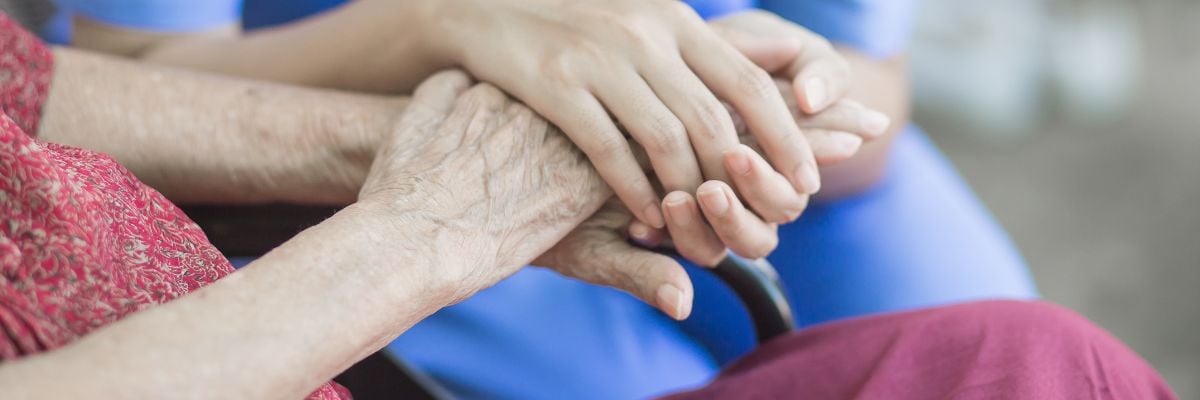
Tom Nash explains the difference between ordinary and extraordinary care for the dying, and how the approach of euthanasia to the latter case differs from the approach of hospice care.
Host: We go now to Wanda in Texas, listening to EWTN on 910 AM. Wanda, you are on with Tom Nash, what’s your question?
Caller: Hi there, thanks for taking my call. I would like to know, after hearing a call on assisted suicide, what is the Catholic Church’s stance on hospice? When the patient gets to the point where treatments have failed, and though there might be something else…they just feel that the time has come.
Tom: Got it. Well, Wanda, we can make distinctions between ordinary care—which would be food and fluids, unless they can’t be processed by the body—and extraordinary care, like a ventilator or something else like that.
So for example, I can make this personal, my father, who died in September 2015, I was there and aiding the cause and helping out with bioethical decisions. And for example, he could still process food toward the latter part—he was in the hospital for three weeks, almost, and he was in his early nineties, so it was getting close to his time in any event, just because he was getting older in life; but we still, because he could process the food—as opposed to it causing problems, which it sometimes can do when the body starts shutting down—he continued to receive that. And then as it turns out, within a week or so he died, and I was blessed to be there.
So we distinguish between ordinary and extraordinary care. Unfortunately, Wanda—and this is where the slippery slope comes in, is that a number of hospitals, typically public but potentially sometimes Catholic, not being as Catholic as they should be, they will say, “Well you know what, this person has no meaningful life,” they go on a “quality of life” argument, and they say therefore, “Well, we’re not going to continue to give them food and fluids. And we’re gonna have them, you know, give them painkillers, morphine and whatnot.”
So what it does is, in fact, hasten the death. Now they would have died anyway, but the proximate cause can be, in such situations, starvation, or it can be an aggravating factor. And then that can open up all kinds of situations with people who are not terminally ill, who can say, “Well, this person’s quality of life—” we’ve even seen people being potentially killed for depression or for other—because they’re a burden, and someone has to take care of them, so—but the judgement is their “quality of life,” so therefore “we can hasten the process.” So that’s why I talk about the slippery slope.
So in hospice, that’s the whole thing about hospice, it’s supposed to not do any harm, but to aid that person transitioning to the afterlife, and if it’s a truly Catholic hospice situation—and any hospice situation should honor your views or any Catholic’s views in that process—then you should have food and fluids as opposed to extraordinary care like a ventilator. My father was taken off a ventilator, and he ended up living a week or so longer.
Now, you can make the other distinction, that even if you’re taken off a ventilator, it’s always good to still have the comfort of oxygen that can go through the nose. That’s not extraordinary care, and I credited at the University of Michigan some of the palliative care nurses, who, you know, help at the end of life; they had a better sense about that than did the doctors, because the doctors were saying, “Well, I don’t think it’ll make that much of a difference.” It’s like, yeah it can, and the nurses would say that, and indeed his oxygen count went up when he had that, so that made him more comfortable, which is supposed to be the goal. So was that helpful as an overview?
Caller: Yeah, my mom passed in June of 2015, and she was actually a home hospice, I took a leave of absence to care for her.
Tom: God bless you.
Caller: And she did great. The cancer came back and it was just everywhere…and I mean, it was the last three days she stopped eating and drinking, but she died very peacefully in my home.
Tom: There, that’s good. Now, you know, sometimes when people stop eating because they lose their appetite, that’s different than someone starving themselves, right? Sometimes at their latter stages, they don’t eat as much as a result. Similar to my father, didn’t process as much, he was not conscious at that point. So we can make that distinction.
If someone’s not being able—if someone’s not eating, they’ve lost their appetite, you know, the cancer’s kicking in further, etc., they’re getting the benefit of morphine; and again, people say, “You can’t give them morphine, that could kill them.” Well, as you’re trying to manage the pain, there can be an unintended side effect as opposed to a lethal dose of morphine, right? So one shouldn’t feel bad if a loved one, you know, diminishes their eating toward the last days, or if, to try to keep them comfortable, they’re trying to give them maybe an increase of morphine to manage it better, so they can manage the pain better. If that hastens, as a side effect, their death, then that’s a whole different moral category. So you can feel fine about that.
Caller: Okay. I just—I felt a little worried, though, we gave her just the minimal dose of morphine. That controlled the pain, but I was—you know, I was sitting there listening to that, going, “God, I—” you know, they said “hospice” and she said “Okay, I’m ready.” And she was accepting, she said, “I’m gonna go meet my Jesus.”
Host: That’s beautiful.
Tom: Well, praise God. You know, my mother—I remember my mother, it was 2011, Wanda, and that was the year she died, and I remember in…it was April, and she—I got to visit because a doctor friend of mine said, “Hey, you better come up sooner than later,” and so I came up, and it was around the Easter holiday, and so I was up at that point. But I remember at this one care center she was going to, that there was—they were—I’m thinking, “They’re trying to ask her too much, she just doesn’t have that physicality.” I mean, mom was a vibrant woman, and very dedicated, and a mother of a big Catholic family, but she just didn’t have it—it’s not a question of quitting, it’s a question of running out of gas.
And so as it turns out, mom went in to hospice care, I remember being able to come back and see her as she went into the hospice care, and then, you know, saying goodbye would probably be the last time, although I did talk to her a little bit before she did die. Anyway, so in any event, you know, we got to be able to say goodbyes, and similarly, my little sister had Downs syndrome, I got to say goodbye to her the day before she died.
So these things happen, and sometimes, you know, when it comes to that point in life, it’s not a question of easing them out; that’s assisted suicide. Rather, in hospice care, they’re still being able to receive ordinary care, they’re just not going to have extraordinary care.
And one last thing to make it helpful, perhaps, is that with my father I said, “Hey, would you guys please put these monitors on?” And they go, “No, because you can’t have any [of what we would call] extraordinary care.” And I said, “Look, I understand the fact, I understand that this is similar to hospice care—” cause he was going to be transferred over to hospice care, but it was on the eighth floor of University of Michigan hospital, I said, “I understand it, I’m a Catholic man, I work for the Church, I have faith, I understand that life here is not the last word; but I would like to be aware, if I’m sleeping, that I would be woken up so that I could be there in his last moments.”
And so after a bit of back-and-forth, they did, and it certainly helped, at 6:29 AM on September 24th—Friday, September 24th, feast of the Sacred Heart, he had a great devotion to the Sacred Heart, also to the Blessed Mother—that the monitors started beep-beeping, and indicating that within, like, 30 seconds or so, dad had died, and I just said, you know, “Dad, go to Jesus, go to Jesus, go to the Lord.” And it was a beautiful moment, I’m glad that on behalf of my family I could be there, cause other people were coming but it was early in the morning, and I’m glad that I could be there.
And God bless you for being there for your mother, that you could be there for her—or I’m sorry, I apologize, did you say your father or your mother?
Caller: My mom and my dad, my dad in 2000, my mom in 2015, I was blessed because I was there when both of them died.
Tom: Okay, so it was your mom. Gotcha. Well, God bless you for being there. I mean, that’s so…important and so loving on your end, such a great witness, cause oftentimes…well…or too often, we’ll say, children can’t be bothered sometimes. And God bless you for showing otherwise.
Host: And thank you, Wanda. It does sound like you had some anxiety about it, and it does sound also, from everything Tom said, there’s no reason for you to have anxiety about that. It seems that you were a very good daughter to your parents there at the end. Thank you very much, Wanda.



